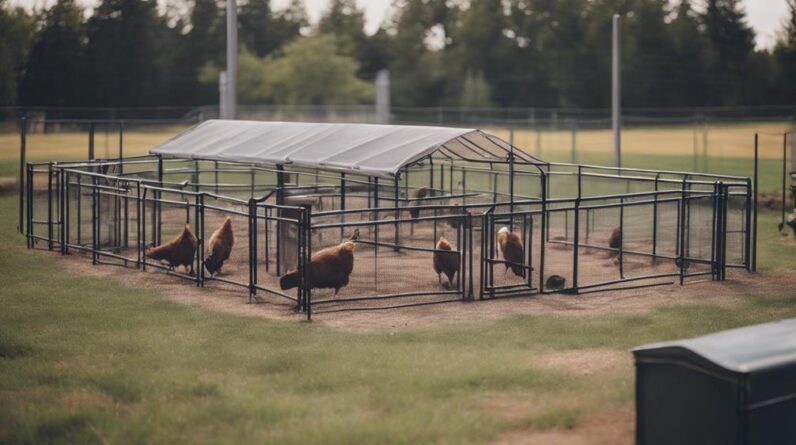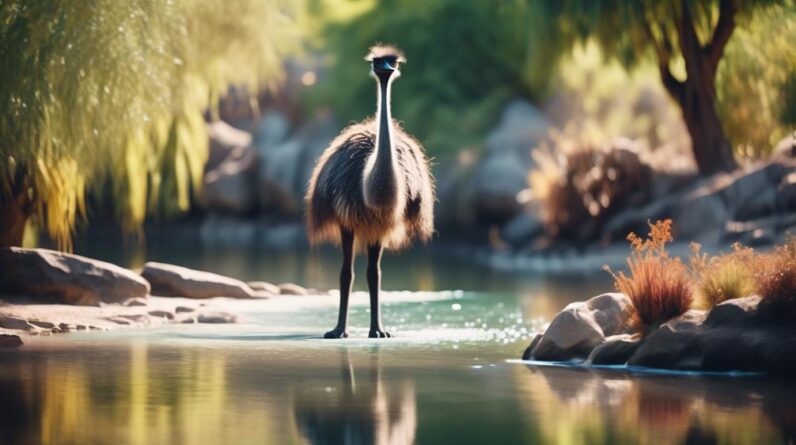
Did you know that water makes up approximately 75% of an emu's body weight? That's quite a staggering statistic!
But have you ever stopped to consider the vital role that water plays in the health and well-being of these magnificent birds? It goes beyond just hydration; water is essential for their digestion, body temperature regulation, and overall nutrient balance.
In this discussion, we will explore the importance of water for emu health, the dangers of dehydration, and some helpful tips for providing ample water to keep these fascinating creatures thriving.
So, let's dive into the world of emus and discover why water is their lifeline.
Key Takeaways
- Emus have various adaptations for water conservation in arid environments.
- Adequate hydration is crucial for emu health, digestion, and overall well-being.
- Water plays a vital role in emu digestion, nutrient absorption, and maintaining a healthy body temperature.
- Access to clean and fresh water is essential for emus to prevent dehydration and support their physiological processes.
Water: The Lifeline for Emus
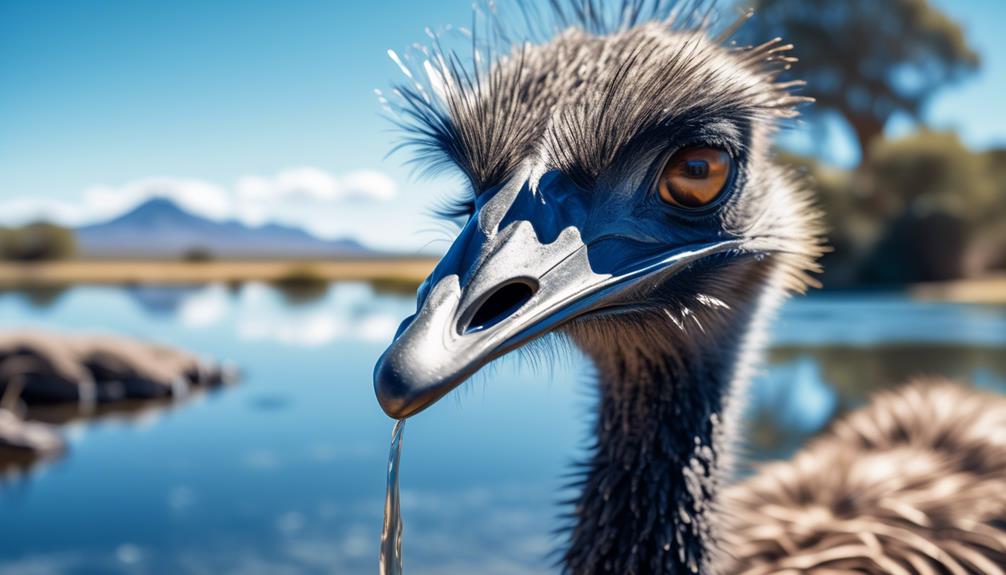
Water is essential for the survival and well-being of emus, playing a crucial role in maintaining their physiological functions and overall health. Emus are large flightless birds found in the arid and semi-arid regions of Australia. In these harsh environments, water conservation is of utmost importance for emus to thrive.
Emus have evolved unique adaptations to cope with limited water availability. One such adaptation is their ability to reduce water loss through their feces. Emus produce dry feces with minimal water content, allowing them to conserve precious moisture in their bodies.
Another way emus conserve water is through their exhalation. They've a specialized respiratory system that minimizes water loss during breathing. Emus exhale air that's cooler and drier than the ambient environment, reducing the amount of water lost through the respiratory tract.
In addition to water conservation, emus have also developed alternative hydration methods. These birds can obtain water from dew on plants, which they can lick off using their long beaks. They also have the ability to obtain moisture from their food sources, such as succulent plants and insects.
Understanding the importance of water for emus and implementing water conservation measures are essential for their long-term survival in their natural habitats. By preserving water sources and creating suitable environments, we can ensure the well-being of these magnificent birds.
Hydration and Emu Health
To maintain optimal health and well-being, emus require adequate hydration. Water is essential for various physiological processes within their bodies, including digestion, temperature regulation, and waste elimination. Proper hydration ensures that emus can function at their best and avoid potential health issues caused by dehydration.
Consider the following points to understand the significance of water intake in emus:
- Sustainable water conservation: Emus are adapted to arid environments where water sources may be scarce. They've evolved to conserve water efficiently, minimizing their overall water requirements. By understanding their unique physiology, we can better appreciate the importance of providing emus with enough water to meet their specific needs.
- Preventing dehydration: Emus have a high water turnover rate, making them susceptible to dehydration. Inadequate water intake can lead to reduced egg production, impaired immune function, and decreased overall health. Ensuring emus have access to clean and fresh water at all times is crucial to preventing dehydration.
- Hydration for optimal performance: Proper hydration directly affects the performance and well-being of emus. Emus that are well-hydrated exhibit increased activity levels, improved digestion, and enhanced overall health. By prioritizing their water intake, we can promote the well-being of these magnificent birds.
Understanding the importance of water conservation and meeting the water intake needs of emus is vital for their health and well-being. By providing them with adequate hydration, we can ensure that they thrive in their environment and lead happy, healthy lives.
The Role of Water in Emu Digestion
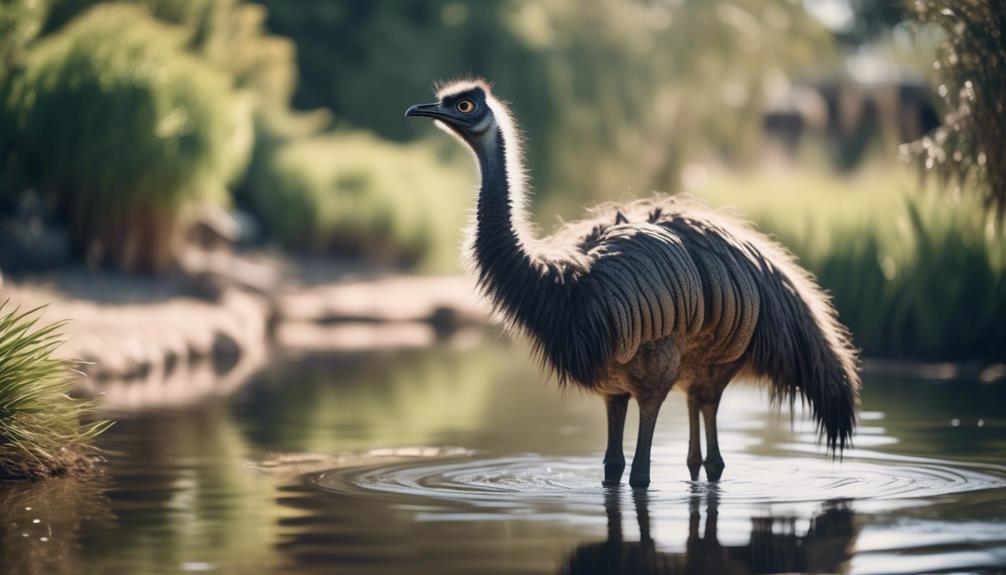
Proper hydration plays a crucial role in facilitating the efficient digestion of food in emus. Emus, like other avian species, have a unique digestive system that requires adequate water intake to ensure optimal functioning. Emus have a remarkable ability to regulate their water balance, allowing them to survive in arid environments. They can retain water for extended periods, which helps them adapt to their natural habitat.
Water consumption in emus is directly related to their growth and overall health. Emus require an ample supply of water to support the breakdown and absorption of nutrients in their gastrointestinal tract. The presence of water in the digestive system allows for the proper breakdown of food particles and the efficient absorption of essential nutrients.
When emus consume food, their digestive system secretes enzymes and gastric juices that aid in the breakdown of complex molecules. Water acts as a solvent, facilitating the enzymatic activity and making the digestion process more efficient. It helps in the mechanical breakdown of food, allowing emus to extract and absorb the necessary nutrients.
Without sufficient water intake, emus may experience digestive issues, such as constipation or impaction.
Water and Emu Body Temperature Regulation
Emus' ability to regulate their water balance not only aids in digestion but also plays a crucial role in regulating their body temperature. Water is essential for emus to maintain their internal body temperature within a narrow range, especially in hot and arid environments.
Here's how water influences emu behavior and breeding patterns:
- Hydration: Emus need water to stay hydrated, and adequate hydration helps them regulate their body temperature effectively. When emus have access to water, they can cool themselves by wetting their feathers and allowing evaporation to take place, which dissipates heat and helps them stay cool.
- Behavioral adaptations: Emus exhibit certain behaviors to cope with temperature fluctuations. They may seek shade during the hottest parts of the day to avoid excessive heat exposure. Additionally, emus may reduce their activity levels and conserve energy during extremely hot weather to prevent overheating.
- Breeding patterns: Water availability can influence emu breeding patterns. Emus are more likely to breed during periods of increased rainfall when water sources are abundant. Adequate water supply ensures that emus have the necessary resources for successful reproduction and raising their young.
Understanding the impact of water on emu behavior and breeding patterns is crucial for their overall well-being and survival in different environments. By providing access to clean water, we can support their natural thermoregulatory mechanisms and help maintain healthy populations of these remarkable birds.
Water as a Key Nutrient for Emus
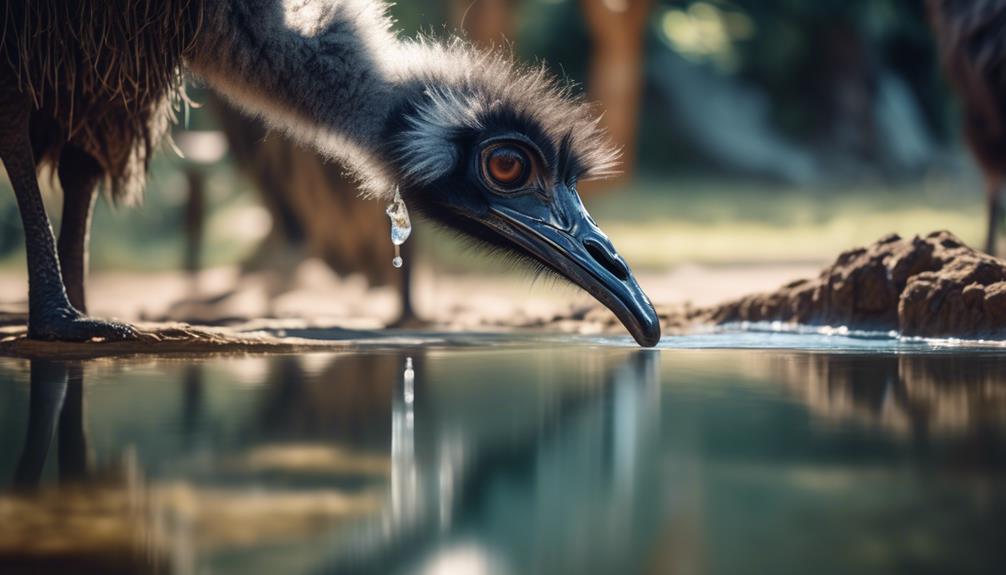
Water is an essential and vital nutrient for the optimal health and well-being of emus. These magnificent flightless birds rely heavily on water for various physiological processes, including digestion, temperature regulation, and overall hydration. Emus have a unique and efficient system for conserving water, enabling them to survive in arid environments.
Emus possess specialized adaptations that allow them to extract and utilize water efficiently. Their kidneys are highly efficient at conserving water by producing concentrated urine, reducing water loss. Additionally, emus have a large cecum, a pouch-like structure in the digestive system, which helps them absorb water from their food more effectively. These adaptations enable emus to survive in areas with limited water availability.
Water quality is also crucial for emu health. Emus require clean and fresh water to prevent the risk of waterborne diseases and ensure optimal hydration. Contaminated water sources can lead to digestive issues, dehydration, and compromised immune function in emus. Therefore, it's essential to provide emus with access to clean and uncontaminated water sources to maintain their health and well-being.
The Importance of Clean Water for Emu Health
To maintain optimal health, emus rely on access to clean and uncontaminated water sources. Clean water is essential for emu health as it plays a crucial role in various physiological functions.
Here are three reasons why clean water is of utmost importance for emus:
- Hydration: Emus, like all living creatures, require water for hydration. Water is vital for regulating body temperature, digestion, and nutrient absorption. Emus need regular water intake to stay hydrated and maintain their overall health and well-being. Without access to clean water, emus may become dehydrated, leading to a range of health issues.
- Disease prevention: Clean water helps prevent the spread of diseases among emus. Contaminated water sources can harbor harmful bacteria, parasites, and other pathogens that can cause infections and diseases. Regular intake of clean water can help emus stay healthy and reduce the risk of waterborne illnesses.
- Nutrient absorption: Water is essential for the proper digestion and absorption of nutrients in emus. It aids in breaking down food and facilitating the absorption of essential nutrients into the bloodstream. Without clean water, emus may experience digestive issues, nutrient deficiencies, and overall poor health.
Dehydration: The Dangers for Emus
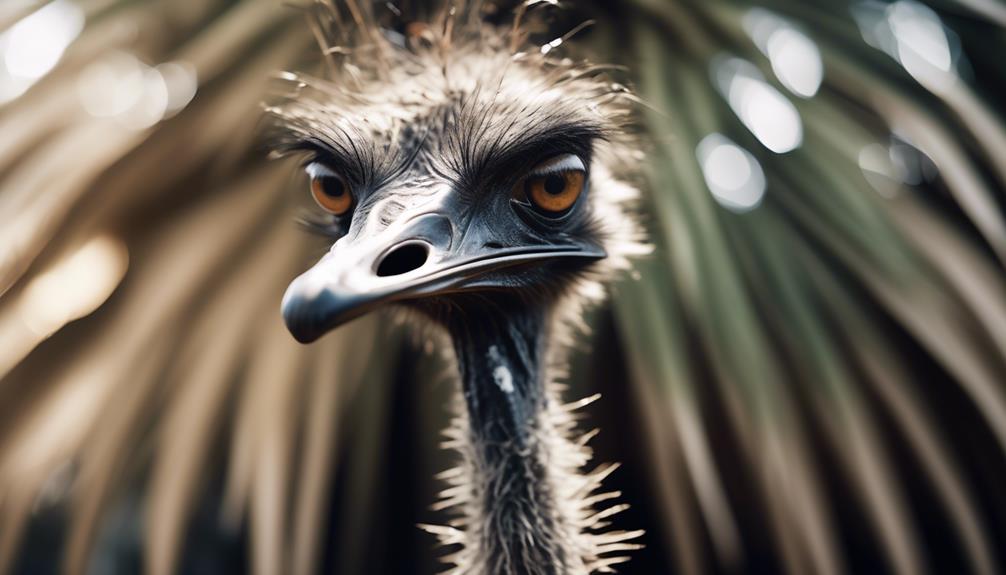
Dehydration poses significant risks to the health and well-being of emus. As large flightless birds, emus are particularly susceptible to heatstroke, which can occur when their bodies lose more water than they can replace. Heatstroke can be life-threatening for emus, leading to organ damage, impaired bodily functions, and even death if not treated promptly.
Recognizing the signs of dehydration in emus is crucial for their welfare. Some common indicators include excessive panting, drooping wings, lethargy, sunken eyes, and dry, sticky beaks. Emus may also exhibit decreased appetite and produce less waste. It's essential to monitor their water intake closely and ensure they've access to clean, fresh water at all times, especially during hot weather or periods of increased activity.
To prevent dehydration and the associated dangers, provide emus with shaded areas to seek relief from the sun's heat and install misters or sprinklers to cool their environment. Regularly check the water quality and cleanliness, as contaminated water can also contribute to dehydration. Furthermore, adjusting the diet to include water-rich fruits and vegetables can help maintain hydration levels.
Tips for Providing Ample Water for Emus
Given the risks of dehydration for emus, it's imperative to implement effective strategies to ensure they have access to an ample supply of water. Providing appropriate water sources and following water consumption guidelines are crucial for the well-being of these magnificent creatures.
Consider the following tips to ensure your emus have the water they need:
- Provide fresh and clean water: Emus require clean water to stay hydrated and maintain their health. Ensure their water sources are free from contaminants and regularly replenish the water to keep it fresh.
- Offer multiple water stations: Emus are social animals that thrive in groups. By providing multiple water stations, you enable all emus to have equal access to water, reducing the risk of dehydration and potential conflicts.
- Monitor water consumption: Keep a close eye on your emus' water consumption. Emus should consume approximately 2-4 liters of water per day, depending on their size and environmental conditions. By monitoring their intake, you can quickly identify any changes in their hydration status.
Frequently Asked Questions
How Much Water Should an Emu Drink in a Day?
You should consider various factors when determining how much water an emu should drink in a day. Emu water consumption depends on factors like temperature, activity level, and diet.
Can Emus Get Water From Other Sources Besides Drinking?
Emus, like many other animals, rely on water for hydration. While drinking is the primary source, they can also obtain water from juicy plants and succulent insects. However, it is crucial to ensure they have access to clean drinking water for optimal health and well-being.
What Are the Signs of Dehydration in Emus?
If an emu shows signs such as sunken eyes, dry skin, and decreased urination, it may be dehydrated. To prevent dehydration, ensure access to clean water, especially during hot weather or when emus are exerting themselves.
Are There Any Specific Water Requirements for Emus in Different Seasons?
In different seasons, emus have specific water requirements to maintain their health. Water quality plays a crucial role in their well-being. Ensuring they have access to clean and adequate water is essential for their overall health and vitality.
Can Emus Survive Without Access to Water for Extended Periods of Time?
Emus, like other desert-adapted animals, have evolved water conservation mechanisms and can survive without access to water for extended periods. Their physiology and behavior allow them to withstand drought conditions, showcasing their impressive drought resistance.
Conclusion
Ensuring a consistent and abundant water supply is of utmost importance for the health and well-being of emus. Water plays a vital role in their digestion, body temperature regulation, and overall nutrient intake.
Clean water is crucial to prevent dehydration, a dangerous condition for these birds. By providing ample water, emu owners can safeguard their birds' health and contribute to their overall welfare.
Remember, keeping emus well-hydrated is a fundamental responsibility for their optimal care.





